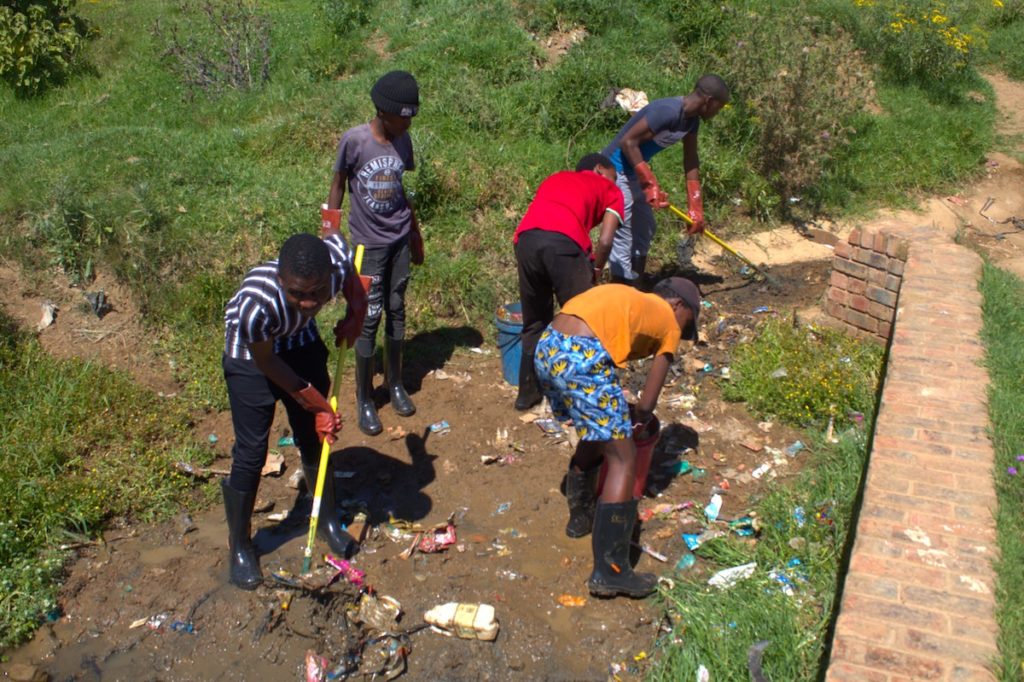Each month we like to share the story of where your thank offering has gone in recent years. This article is from the final grant report for this project.
Give us an overview of how your project went.

The project aimed to train, educate, and support a group of high school learners to become environmental change-makers in their community. After an initial phase in 2022 where the group of high school learners took part in the cleanup of different waterways in Makhanda, it was decided to adopt one specific river at the end of 2022 where cleanup efforts, community campaigns, and media production would take place. This was done in order to have more long-term impact in one area instead of spreading the resources too thinly. The river chosen was located in the relatively impoverished community of Vukani. (The name Vukani in isiXhosa fittingly means “Wake up!”)
Excursions were planned every second Saturday for learners to go to the Vukani location to clean the river that had been previously neglected. Members of the community from the area where the river is situated often joined the learners and helped with the cleaning—it was especially encouraging to see many of the younger children joining in. During those excursions, learners had to create media by making use of tablets and cameras. Photos and videos were taken, and members of the community were also interviewed about the history of the rivers and the impact our project has on the environmental issues of the area.
Throughout 2023 the project sought to draw in the community of Vukani in the cleanup efforts. This was done in order to create more awareness of environmental issues and make the community take ownership of the responsibility of keeping the river clean and healthy. In addition, older community members told our young learners about the traditional uses of the river, which has been neglected the last decades due to its deteriorating state. The community effort culminated in an awareness event at Vukani in September 2023, where the local ward counselor—the elected political representative of the area—took part. (See https://www.awarenet.org/2023/09/19/rejuvenating-rivers-awareness-event/ for more info.)
The cleanup efforts of the river had a huge visible impact; toward the end of 2023, when we had done many cleanups, the learners were complaining it took much longer to find any rubbish to clean from the river! The number of high school learners who took part consistently in the cleanup efforts and media creation was around 40. They learned valuable lessons about the importance of the environment, climate change, and community involvement, which most of them had little awareness of previously.
The Vukani location has a population of approximately 2,000 to 3,000 people; indirectly all of them were impacted by having a cleaner river environment. Among these, an estimated 100 either helped in cleanup efforts, were interviewed by learners, or took part in the awareness event.
What was the best thing that happened because of this grant?
The best thing that happened as part of this grant award was to see that we were getting closer to our goal of creating a cohort of environmental change-makers. The high school learners in the project were previously not very conscious about environmental issues—when we initially talked to them about these issues, they felt this was something purely academic they had learned about in school which did not affect their everyday lives.
However, after participating in the project for around one-and-a-half years, many of the high school learners expressed clearer opinions around the importance of having a clean and pollution-free environment in their local neighborhoods and communities. The learners associate environmental issues with local concerns relevant to their own lives (the video can also be obtained in a better resolution, it had to be downscaled in order for it to be uploaded on the website).
We hope that this cohort of learners—a group of engaged youth who volunteered for the project and therefore are potential future community leaders—will be able to draw on their experience with environmental issues in this project when navigating the myriad of challenges they will face as adults in South African society. We believe that their increased consciousness around the environment will indeed stay with them.
“The project offered an opportunity for some of our young people to learn and be involved in their environment. People tend to see rivers as spaces to dump rubbish. It’s good for the youth to learn about the impact our actions have. They could physically experience this when clearing and cleaning,” said the Rev. Melany Adonis.